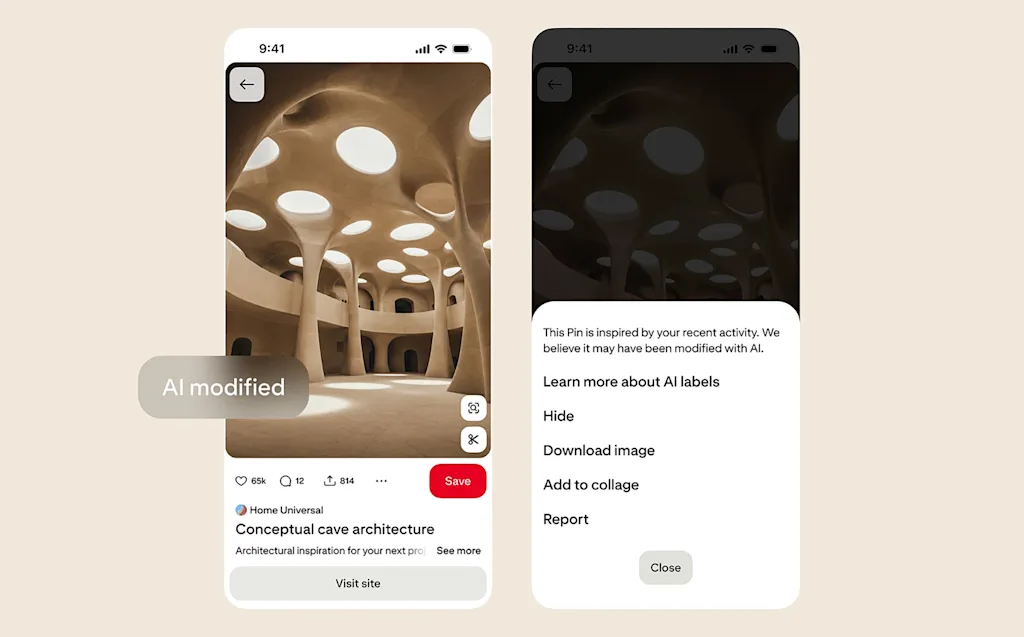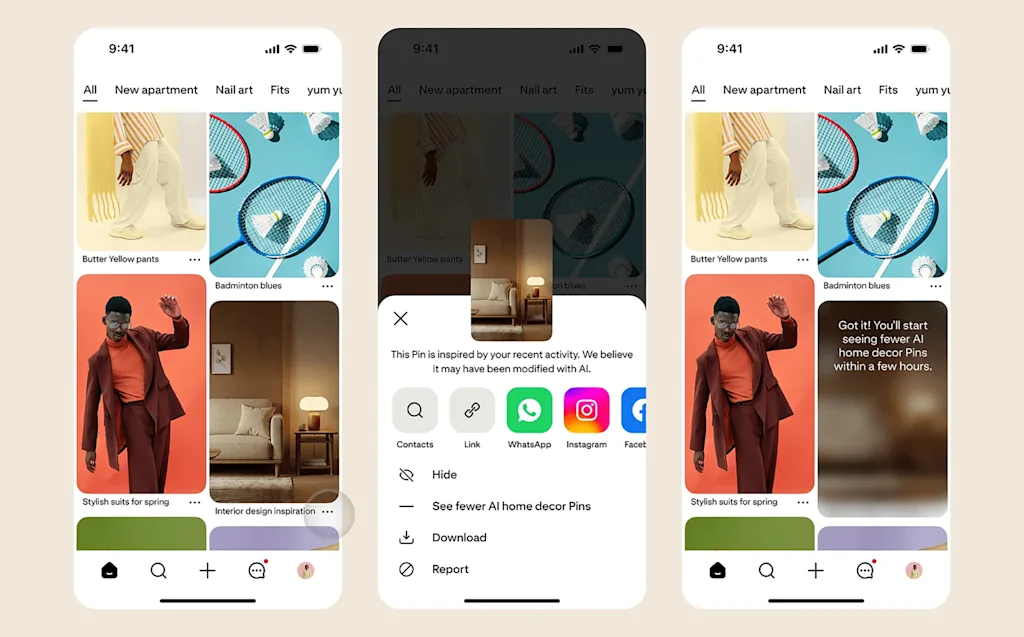For more than a decade, social platforms have faced criticism for embedding algorithms that fuel compulsive behaviors, encourage doomscrolling, and measure success by time spent glued to screens. Pinterest, long positioned as a calmer alternative, is now attempting something bolder: reimagining personalization through AI.
Chief technology officer Matt Madrigal calls this shift moving from “addictive to additive,” using algorithms as tools to help people design the digital worlds they want.
“Unlike other platforms, Pinterest’s algorithms aren’t designed to keep users hooked, which can lead to feeling overwhelmed, anxious, and distracted,” he tells Fast Company. “Our taste graph serves as the foundation of our AI systems and enables our recommendations to deliver highly personalized experiences. It maps hundreds of billions of unique interactions that connect interests, goals, and behaviors to help users cut through the noise.”
Madrigal, who once led Google Shopping’s merchant products, now guides Pinterest’s foundation AI models with a philosophy that values respect as much as relevance. “AI is at its best when it serves real human needs rather than just optimizing for clicks or transactions,” he says. “During my time at Google, I also saw how frictionless commerce could empower shoppers and brands. At Pinterest, our AI strategy isn’t just about personalization for relevance, it’s also about serendipity.”
Pinterest’s multimodal discovery system powers visual search that Madrigal says is 30% more effective than leading off-the-shelf models. Its Inclusive AI features allow beauty and fashion searches to be refined by hair pattern, skin tone, and body type.
The philosophy shows up in product choices, too. Pinterest has added AI-generated content labels, a “show fewer AI Pins” toggle, and an option to opt out of having activity used to train models. “We reject the false dilemma that maximizing AI innovation means sacrificing responsible development,” says Madrigal.
While rivals face scrutiny for algorithmic harms, Pinterest is betting that transparency and user control can be a competitive edge.

The Responsible Approach in the AI Arms Race
Meta is embedding AI deeper into Instagram and Facebook; TikTok is sharpening recommendations and expanding commerce; YouTube relies on AI to drive stickier engagement. Pinterest’s 2025 rollout takes a different tack, emphasizing responsibility as much as personalization.
New tools include Personalized Background Generation, which transforms plain product images into lifestyle-ready visuals tailored to a user’s aesthetic, and Performance+, an automation suite that reduces friction for marketers by optimizing ads with fewer inputs.
Madrigal points to Prada’s leather goods campaign as an example: a 64% decrease in cost per action and a 30% conversion rate lift. He says these ad tools have helped fuel a 19% year-over-year revenue increase to more than $3 billion.
The most visible change is the AI-generated content label. Pins created or edited with generative AI now carry clear tags, embodying what Madrigal calls “AI with guardrails.”
“There is a demand from users and creators for more transparency and control over the generative AI content they see,” he explains. “AI is instrumental in enhancing both user engagement and monetization. Ultimately, embedding positivity within our business model has proven successful.”

Can AI Balance Engagement and Responsibility?
Pinterest’s latest earnings highlight both traction and tension. In Q2 2025, revenue hit $998 million and monthly active users rose to 578 million, driven largely by international growth and Gen Z adoption. Yet Wall Street shrugged—shares fell more than 12%, slipping into the $35–$36 range, even as revenue topped expectations. Since November 2024, the company has also repurchased nearly 10 million shares.
Commercial pressure, experts warn, often favors stickiness over restraint.
“History has shown that publicly traded companies often are forced to optimize for shareholder value, and for shareholder value, they need to make the most revenue and the most profits. This directly correlates to engagement, so they do create loops that get the most engagement,” Ajit Varma, VP of product for Firefox at Mozilla, tells Fast Company. “But as there are choices and people are preferring those choices, there will always be a future where AI is serving humanity versus serving the profit interests of companies.”
That tension exposes the limits of an advertising-first playbook. Varma argues that users should be able to “vote” with their choices—opting for systems that reflect their values, whether open-source, transparent, or safety-first. “Ultimately, it’s up to users to demonstrate that they value these alternatives by choosing and using products built on different models.”
Pinterest’s challenge isn’t only delivering on that vision; it’s proving to users and investors that additive AI can rival addictive AI. If its 2025 playbook succeeds, it could set a precedent that real power lies in generative systems that enhance creativity while respecting boundaries.
“I envision a platform that deeply understands not only what users search for, but the context behind their interests, aspirations and moods. AI will be the engine, but inspiration and positivity will remain our North Star,” says Madrigal. “Across various teams, we’re working on creating new AI solutions that power the entire end-to-end user experience and we’re bringing in top talent to help make it happen.”
Connectez-vous pour ajouter un commentaire
Autres messages de ce groupe

Artificial intelligence company Anthropic said on Tuesday it is now valued at $183 bill

Legal sports betting is still not offered in California or Texas, the country’s two most populous states—and in Florida, the third most-populous, it’s largely controlled by the Seminole Tribe. But

A new startup called Ridley wants to make it cheaper to sell a home by challenging the traditional real estate commission model.
Founder and CEO


For all the many features it’s been lobbing into the world lately, Trello hasn’t given its most dedicated fans the one thing many of them crave most—and that’s a ticket back in t

Over the past three years, I’ve changed email providers three times without ever changing email addresses.
That’s because my address is entirely under my control. Instead of relying on a

If you dread the weekly grocery shop, or get sidetracked by fun snacks only to end up with no real meals, this might be the hack for you.
The 5-4-3-2-1 method gives shoppers like you a s
